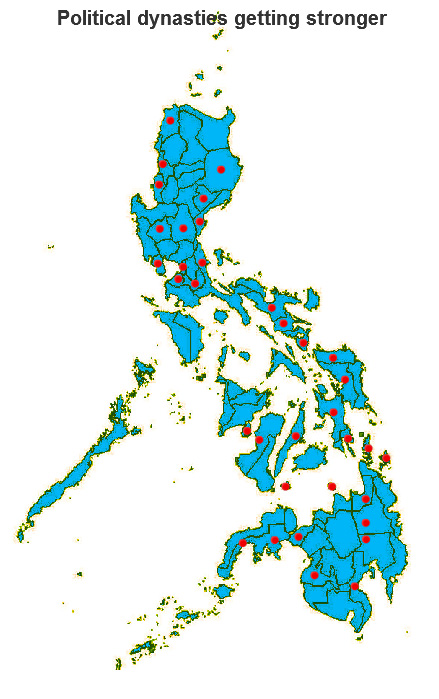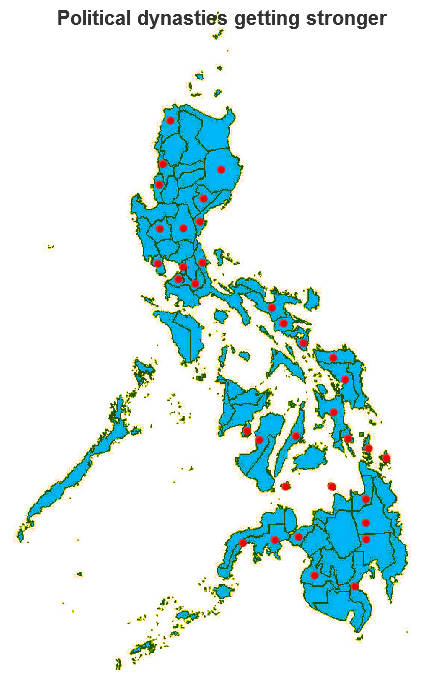By YVONNE T. CHUA, LUZ RIMBAN and AVIGAIL OLARTE
 MONDAY’S election was supposed to have ushered Filipino voters into the modern age of computerized voting, but the results show the country will remain stuck with feudal-style politics as dynasties secured elective positions at the provincial, congressional and local levels.
MONDAY’S election was supposed to have ushered Filipino voters into the modern age of computerized voting, but the results show the country will remain stuck with feudal-style politics as dynasties secured elective positions at the provincial, congressional and local levels.
In at least 34 of the country’s 80 provinces, political families won tandem posts—one family member winning as governor and another as representative—in a new configuration that will give them a lock on power for years to come.
In around 20 of the country’s cities, the winning candidates for mayor had relatives also winning as representative, governor or both.
More than 80 percent of election results have been transmitted from the polling precincts.In La Union, Manuel, Victor Francisco and Pablo Ortega won as governor, representative and mayor of San Fernando City, respectively.
Isabela’s Faustino III, Napoleon and Benjamin Dy were elected governor, representative and mayor of Cauayan City, respectively.
In Bataan, Enrique Garcia is governor, Albert Raymond Garcia is representative of the second district, and Jose Enrique Garcia III is the mayor of Balanga City.
In Bukidnon, former governor Jose Ma. Zubiri slides down to vice governor, Jose Ma. Zubiri III and Ignacio Zubiri are frontrunners in the congressional and Malaybalay City mayoral race. Add to that Juan Miguel Zubiri who is already a senator.
Another combination is that of Cebu where the Garcias won the governorship again as well as two congressional districts. The same happened in Lanao del Norte with the Dimaporos.
The same old families that have been in politics for decades, those staging a comeback, or the budding dynasties have managed to consolidate their local bases in 15 provinces in Luzon, eight provinces in the Visayas, and 11 in Mindanao.
There is also the case of the Jalosjos family which fanned out in two provinces. In Zamboanga Sibugay, two children of convicted rapist and former representative Romeo Jalosjos have been proclaimed governor and congressman. In neighboring Zamboanga del Norte, two other Jalosjos family members will also become representatives, while a third becomes mayor of Dapitan City.
Crucial posts
 The posts of governor and representative are both crucial at the local level. Governors control local officials from mayors down to barangay captains and kagawads who constitute the political machinery that could spell victory in future elections. They also enjoy a sizable chunk of the internal revenue allocation, the chief source of revenue for many local government units. Members of Congress, in turn, control pork barrel allocations.
The posts of governor and representative are both crucial at the local level. Governors control local officials from mayors down to barangay captains and kagawads who constitute the political machinery that could spell victory in future elections. They also enjoy a sizable chunk of the internal revenue allocation, the chief source of revenue for many local government units. Members of Congress, in turn, control pork barrel allocations.
In the past, representatives had to beg governors for political support, while governors had to beg congressmen for pork barrel allocations. It was crucial then that they were either party mates or had good working relationships.
This year’s elections, however, brought this to a new level by consolidating both positions in one family in nearly half of all provinces.
These dynasties also seem to have mastered the art of skirting the three-term limit which was imposed in 1998. The new arrangement allows two or three family members to serve in office at the same time, coming after 12 years of experience lending one elective position to spouses, children or other relatives. Now, they could all sit in office together and still trade places when their terms are up.
Various factors could explain why, despite the automated system that was supposed to modernize elections, such feudal, family-based politics has prevailed.
Planning ahead, vote-buying
Political strategist Malou Tiquia told VERA Files in an interview before the elections that political machinery would be a factor in this election. Since the voting and counting would be automated and there would be no room for old-style cheating and fraud, she said what candidates would likely focus on was “mobilization and election day operations.”
Part of this, she said, was having ward leaders shepherd voters to polling precincts way before polls open to ensure that their voters get inside and vote early, making their voters hog the lines to prevent the opposing camp from getting its voters in.
Related to this factor are vote-buying and, worse, coercion or harassment that has led to violence perpetrated by supporters and private armed groups maintained by some of these political families.
Various reports from all over the country indicate that money flooded this year’s polls, with some operators offering voters as much as P7,000.
Shortly before the elections, Pampanga Gov. Eddie Panlilio had called on the Commission on Elections to look into claims of vote-buying allegedly perpetrated by the camp of his opponent, Lilia Pineda. He cited instances of new forms of vote-buying activities, including multilevel recruitment of coordinators and poll watchers, job fairs, raffle draws, gift-giving and outright handing out of cash to voters.
In Camiguin, the National Union of Journalists of the Philippines condemned the mauling of cameramen Herbert Hugo Dumaguing and his son Hubert by supporters of the Romualdo family. The Dumaguings caught on camera the Romualdos and their supporters giving out money to voters on the election eve. Another journalist, Rolando Gono, went missing after being mauled also by Romualdo’s men.
In Nueva Ecija, callers clogged the phone lines of the provincial police headquarters in the evening of May 9 to report incidents of vote buying, said Supt. Ricardo Marquez.
The callers were reporting the “gapangan” or crawling in some part of Cabanatuan City, an attempt by local candidates to ensure their win by flushing out reluctant voters in the dead of the night and sealing the virtual contract with some cash.
“But there was nobody there when the police officers deployed reached the reported area,” Marquez said.
Earlier, tricycle drivers, senior citizens and market vendors in this city reportedly received P200 each in exchange for the vote for a mayoral candidate.
The election watchdog Task Force 2010 reported that some officials in Bicol were offering voters P1,000 and an all-access pass to the Camarines Sur Watersports Complex, and even scholarships for their children.
Another civil society group, Gabay Halalan, said voters in Taguig were brought to the Sunshine Mall at the Food Terminal and given money. “Indelible ink was dabbed on a number of voters’ fingers to prevent them from voting. Others were detained if they refused to cooperate,” the group said.
In Pangasinan, Gabay Halalan said, barangays who could deliver zero votes for a certain gubernatorial candidate were promised a P200,000 prize.
In Bukidnon, vote buying was rampant, and many voters reported receiving “something” from a candidate.
The Legal Network for Truthful Elections (Lente) reported vote buying in some areas in Sulu, where voters were being assisted by poll watchers in shading the ballots.
Although the police and military have called this year’s election the “most peaceful,” law enforcers themselves recorded at least 27 persons killed and 40 injured as a result of election-related violence from election day to Wednesday.
The Consortium on Electoral Reforms, a non-government poll watchdog, recorded 27 violent incidents on election day itself, with 22 fatalities and 24 wounded or injured. “Pending verification of other reported incidents, May 10 will perhaps register the highest rate of casualties, compared to immediate past elections,” the NGO said.
The CER said most of the victims were voters going to their polling centers or lining up to vote and supporters of rival candidates crossing each other’s paths.
Splitting affiliation
Another factor that could have carried families to victory in this year’s election was the practice of members splitting affiliation, to ensure they had a finger in every political pie.
For example, the Ortega family of La Union had members who supported either the administration party Lakas or the Nacionalista Party. The same went for the Zubiris of Bukidnon—the father, Jose Zubiri, supported NP’s Manuel Villar, while his son, Sen. Juan Miguel Zubiri remained with the Lakas-CMD. –with additional reports by Carlos Marquez in Nueva Ecija, Task Force 2010, Gabay Halalan and Maranao People Development Center, Inc.
(VERA Files covered the elections in a partnership with civil society organizations and community journalists.)
